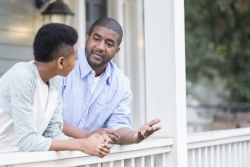4/6/24 blog post
stop solving, start listening: a guide to building stronger connection with kids

Have you ever experienced trying to help your kid work through a problem they’re sharing with you when they blurt out: “are you even listening to me?” In that moment, maybe you thought you were being helpful by wearing your “problem solving” hat but in reality, your kid just wanted you to listen! As parents we have the best intentions to help our kids through challenges and identifying their feelings. But listening to what your child is saying can be even more helpful.
Dr. Kenneth Ginsburg, a pediatrician specializing in Adolescent Medicine at the Children's Hospital of Philadelphia says ““Sometimes there are no solutions and only time will fix the problem; even then, listening offers the gift of unconditional respect.” Dr. Ginsburg also encourages us by saying “Give yourself the gift of losing the fantasy that you’re supposed to have all the answers. Free yourself from the myth that says good parents always have ready solutions.”
So how can we show our kids that we are listening to understand them?
Here are 4 tips for listening to build connection:
- Listen: Sounds simple right? But it can be hard to just sit there and listen without thinking about what to say next. Get used to sitting in silence and allowing them time to think through their thoughts.
- Repeat back. When you respond, repeat what you hear them saying and name the feeling they describe. “It sounds like you are sad because your friends made plans without you.” Clarifying what you heard can help the child identify their feelings if they weren’t able to before and also shows you were paying attention to what they were saying.
- Remain non-judgmental. It can be hard to keep our own emotions in check when our kids are going through a difficult time. Our first instinct might be to try to protect them from heartbreak, making a mistake, or just feeling bad about something. If we show our discomfort, our kids will stop talking. Make sure your body language is reflecting calm even if you are bothered inside.
- Avoid trying to fix the problem. Our first instinct might be to run in with a plan to protect our kids from all harm or help them feel better immediately. We might want to go straight to the school or their friend’s parent. The message this will send them is that you do not think they can solve their own problem or that the only acceptable feeling is happiness. Instead, ask your child what they think next steps might be. They may not want to change the situation or just want someone to vent to. Ask if you can help in any way to show you are there to support them.
When we can show our kids we are listening to understand them, we show that we are a safe place for them to share their thoughts and feelings, even negative ones. Listening to understand is the first step in helping your child work through a challenge. This helps to support them to come up solutions themselves which ultimately helps them to build their self-esteem. The more our kids feel listened to and understood, the more they will continue to come back to talk to us in the future. Having open communication with your kid will increase their overall wellness.
more resources for having conversations with kids
Developing healthy children who build meaningful relationships requires one very important step: having conversations.
The most important relationship to a child is the one they develop with a parent or caregiver. The caregiver serves as the child’s foundation as they grow and change into mature adults. The caregiver’s relationship with a child also sets the stage for that child's future relationships. The best way to build a strong foundation for these relationships is to create safe spaces for children to feel that they can talk with you.
Read more about how to start and have healthy conversations with the children in your life by clicking one of the blogs below!
- how to start conversations with kids (and keep them going!
- how asking the right questions encourages conversations
- what makes you, you? discovering a child's identity
more resources from On Our Sleeves
If you're looking for access to even more resources to help you on your journey to supporting children's mental health, you'll want to become a part of the On Our Sleeves e-community! Our mission is to get our free, expert-created resources to as many caring adults in our communities so that everyone can understand and promote mental health for children.
Join us on this mission, by clicking the orange button below! You'll be signed up to start receiving monthly free content and resources to help you support the mental wellness of children in your life and break the stigma surrounding mental health. You'll also be the first to know about special giveaways like our Activity Book and Conversation Starter Cards.




